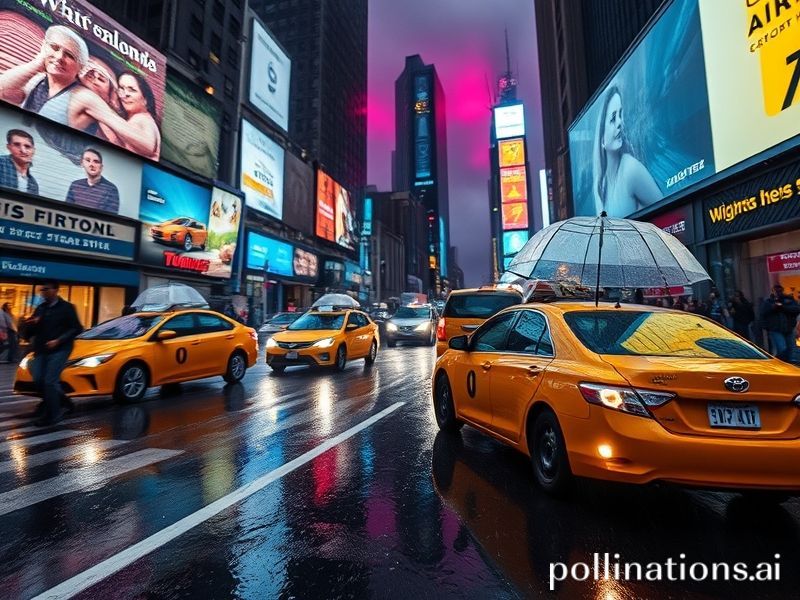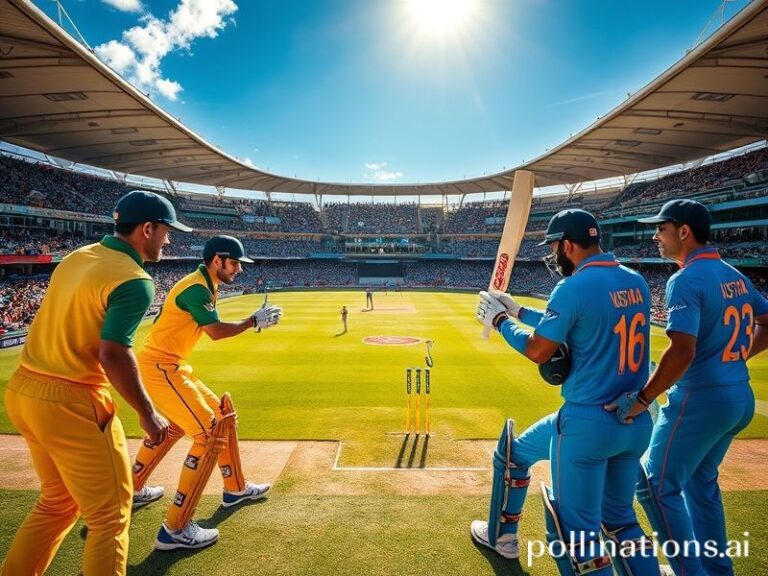When Gotham Sneezes, the Planet Drowns: NYC Weather as Global Omen
Weather NYC: Gotham’s Sky, the World’s Mirror
By Dave’s Locker International Bureau, somewhere between a drizzle and existential dread
NEW YORK—When New York City’s weather sneezes, the planet catches a cold, then immediately posts a 47-tweet thread about supply-chain hiccups. Today the forecast calls for a high of 58 °F, low clouds the color of an overworked diplomat’s passport, and a 60 % chance of rain that will, by lunchtime, be blamed for everything from Shanghai copper futures to the price of your flat-white in Copenhagen. Because if the United Nations meets here, so do the jet streams—and both are equally adept at delivering windy communiqués.
Let’s zoom out. The same low-pressure system currently loitering above the five boroughs began life last week as a tropical depression off Mindanao. It cruised across the Pacific on a baggage carousel of moisture, hopped the Rockies like a trust-fund kid on a gap year, and finally arrived in Manhattan just in time to drench the queue outside a SoHo pop-up selling $200 “rain-core” jackets. Globalization, ladies and gentlemen: even our storms have passports now.
Europe is watching because New York’s misery is Frankfurt’s margin. When JFK starts stacking planes like cheap lawn chairs, Lufthansa rebooks half of Bavaria through Reykjavík, Icelandair’s stock twitches upward, and somewhere in Brussels an EU commissioner updates a PowerPoint titled “Resilience to Transatlantic Weather Disruptions.” The PowerPoint will be 87 pages long and still won’t mention umbrellas—those are considered a member-state competency.
Asia, meanwhile, is already hedging. Tokyo traders have priced the anticipated one-day delay in iPhone shipments into their yen-dollar carry trades. Shenzhen factories recalibrate production schedules because the Port of New York is about to close for “wind events”—a term that sounds like a prog-rock album but actually means your AirPods will arrive two days late and slightly more existential.
Climate scientists call New York a “sentinel city,” which is academic speak for “canary in the coal mine wearing AirPods Max.” When Manhattan’s storm drains start gargling like a hungover tuba, it signals to low-lying brethren from Lagos to Dhaka that the ocean is sending RSVPs to places it used to ignore. The irony, of course, is that the same city that popularized the phrase “Too big to fail” is increasingly too coastal to stay dry. Wall Street has already floated (pun intended) catastrophe bonds indexed to tidal surge; bankers call it innovation, mermaids call it gentrification.
Back on Sixth Avenue, the actual humans—those quaint relics of pre-app civilization—display the universal choreography of urban rainfall: the sudden shrinkage of personal space, the shared grimace under scaffolding, the silent competition for cab doors. A tourist from São Paulo discovers that “light drizzle” in NYC still requires architectural-grade raingear; a banker from London feels nostalgically at home, only the dollar slices aren’t as good as Greggs. Everyone’s hair achieves bipartisan unity: frizz across all demographics.
And yet, by tomorrow the same weather system will be somebody else’s problem—perhaps a nor’easter gifting Nova Scotia its annual identity crisis, or a subtropical remnant watering Ireland so thoroughly the sheep start mildewing. New Yorkers will have moved on to complaining about heat, or taxes, or the Knicks. The planet spins, the jet stream meanders like a drunk influencer on a yacht, and the cycle repeats: cause, effect, meme, policy paper, shrug.
So when you check your weather app tonight and see that innocent little cloud icon hovering over Manhattan, remember it’s not just precipitation. It’s a global press release with precipitation attached—a reminder that in the 21st century, local weather is the last truly international story, delivered fresh daily with a side of soggy pretzels. Pack an umbrella, diversify your emotional portfolio, and try not to take it personally. After all, the sky’s mood swings are bipartisan, multicultural, and entirely unimpressed by your VPN.







